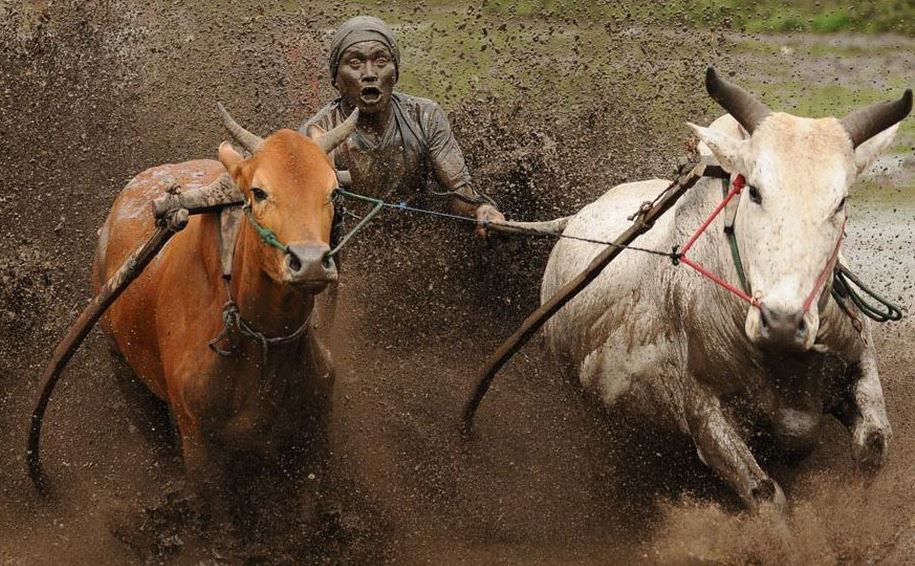What if I told you the use of a single technology in racing could tackle overproduction, transform our integrity issues and take our sport to the next generation of racegoers?

What if I told you that this technology was, in effect, walking around the ring without reserve and was available free to us all? What if I told you that racing’s tomorrow might just be starting in Indonesia today?
Jack Cantillon writes on www.thoroughbreddailynews.com that Indonesian farmers have a familiar problem: they want access to a better quality of stock but don’t have the resources to finance it.
Poor-quality cows yield a 20% return to the farmer, which is expected to cover all costs of raising the animal to slaughter. Like many small Thoroughbred breeders, they are trapped in an endless cycle of poor returns, producing animals the market does not want. However, by using blockchain technology to bring together investors with farmers across a country with 18,307 islands, a start-up company called CashCow may have found the answer.

In the case of CashCow, investors fund the cost of better-quality cows and the farmer then raises the cow with no initial outlay. Investors are given confidence to invest because of the information provided by the blockchain–information which can’t be altered and is available freely and frequently despite the geographically diverse locations of the cows.
Upon sale, the market is finally getting what it wants: quality. Farmers are rewarded with a third of the sale price, which more than covers keep; investors receive a third, covering the initial outlay, and another third is reinvested in more cows, which benefits farmers and investors alike.
Why does overproduction of racehorses happen globally?
It happens because, like the Indonesian farmers, breeders want to breed horses but do so with limited resources. The Thoroughbred industry can empower small breeders through ideas like CashCow and incentivise them to upgrade their stock, tackle overproduction effectively and supply the market with better-quality Thoroughbreds which would otherwise be prohibitively expensive.
But in order for us to harvest this technological change, racing needs to understand blockchain. Thankfully, racing has had a blockchain since inception.
Blockchain technology is, essentially, a bookie’s ledger in every punter’s pocket.
Simply put, a blockchain is a type of distributed ledger or decentralised database that keeps continuously updated digital records of who owns what.
Rather than having a central administrator like a traditional database (think banks, governments and accountants), a distributed ledger has a network of replicated databases, synchronised via the internet and visible to anyone within the network. Blockchain gives those who want to solve a problem or capture an opportunity the tools to do so together, without the need of a higher power.

The advent of blockchain would allow trust and radical transparency to flourish in racing and allow a global industry to break down barriers even further. You can’t just tell Goffs you’ll pay for a horse; their blockchain will know if you can. You can’t tell Racing Victoria you didn’t use that steroid; their ledger will know. You can’t fool racing’s book of truth. Our embrace of blockchain technology could have a profound impact on finding a solution to some of racing’s and breeding’s most pressing issues.
In the UK and Ireland, there has recently been a call for training fees to be paid via Weatherbys and HRI, and so they should be.
However, if the authorities don’t see this as feasible, trainers’ associations can help themselves through blockchain. By creating a training-fee blockchain, owners would be held accountable across all trainers as to their fees. A racehorse couldn’t be in training without payment through the service.

You couldn’t pay William Haggas and not James Fanshawe. Trainers would have a united front and complete knowledge. It would also have benefits for owners, through zero transaction fees, a single service to pay all costs, and transparency on outlay.
Racegoer engagement could also be revolutionised through blockchain.
The blockchain technology has allowed the creation of digital cryptocurrencies–bespoke currencies backed by a particular product or area. A
new venture called the London Football Exchange has taken advantage of this and teamed up with some of the world’s biggest football clubs to raise $350- million to launch its own currency using blockchain. This allows clubs to raise equity through the sale of the currency and buyers are rewarded with match-day tickets, exclusive merchandise and VIP experiences only available to holders of the currency.

In the future, will we have an organisation rivaling Coolmore or Godolphin funded through a cryptocurrency? The economies of scale would allow investors to compete with global powers, while the decentralised control would give access and power to all.
Blockchain isn’t a Galileo just yet.
Blockchain products can only process about seven transactions per second, while Visa can process 1,667 transaction per second. The hype-induced volatility of cryptocurrencies such as blockchain-based Bitcoin has sapped consumer confidence. Initial coin offerings (the creation of a digital currency through blockchain and offering it for sale) are currently unregulated, which means investors have no legal protection if the currency becomes worthless.

So the bid board in Tattersalls might be a while away from showing a blockchain-based cryptocurrency just yet. However, if understood properly, blockchain offers us so much which could revolutionise our sport.
The General Stud Book could be owned by all breeders on a blockchain. Our horses’ passports could be on a blockchain app in our pocket. The racing channel could be locally funded by racegoers through a blockchain.
As an industry, we need to move beyond identifying problems to understanding and implementing new solutions. Blockchain gives the power back to the people, not the authorities.
Look beyond the Bitcoin hype to its foundations and we may just have found the building blocks for racing’s future.
-www.thoroughbreddailynews.com








